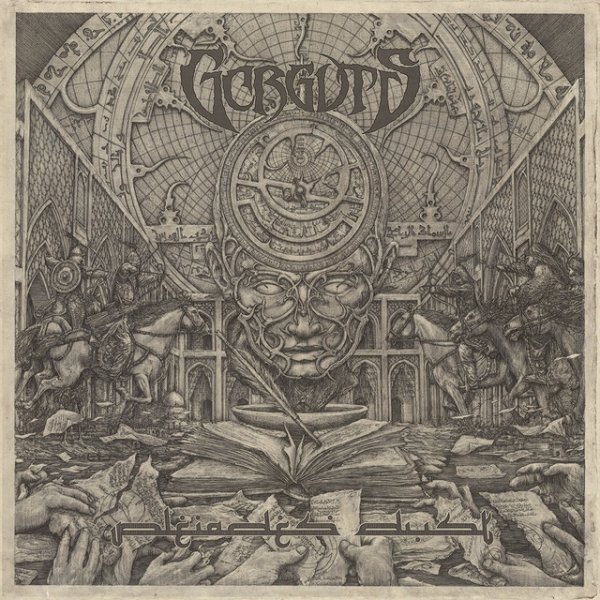(Note: Times of movements are guesses based on lyrics, not taken from official sources)
I. Thinker's Slumber (0:00-4:05)
With the weakening of the Roman Empire at the beginning of the fifth century, Western Europe slipped rapidly into what is now known as the Dark Ages, from which it would not emerge for a thousand years.
Jim al-Khalili - The House of Wisdom
Scornful dogma
Withering era
Silence in sight
Treasures of cognition
Have ceased to be
Destructive minds
Turning life to ashes
Relentlessly
Despotic hands on recollection
Restraining man from recollection
II. Wandering Times (4:05-7:16)
Progress, through reason and rationality, is by definition a good thing; knowledge and enlightenment are always better than ignorance.
ibid
Wandering times
Crawling thoughts abandoned at dusk
Thinker's dream
Lost in doubts
Streams of lore
Concealing in drought
Wandering times
Scripted thoughts emerging at dawn
Scholars' dream
Starts to blink
Streams of lore
Submerging with ink
Glimpse of light in sight
Dazzling minds are turning the page
On darker times
III. Within the Rounded Walls (7:16-9:29)
Like the city of Alexandria, founded a thousand years earlier by Alexander the Great, Baghdad grew from nothing to become the world's largest city just fifty years after the first brick was laid. And just like Alexandria, it became a centre for culture, scholarship and enlightenment that attracted the world's greatest minds.
ibid
Nightfall unfurls its sky
Whispers of waves...mesmerised
Nightfall's canvas unfolds
Frame in time, the stars have told
Mighty circle of stone
Standing strong, on the sands, alone
Rounded walls
Once foreseen
Standing tall
To the thinker's realm
All roads shall lead
IV. Pearls of Translation (9:29-12:44)
(...) the success of a spectacularly massive translation movement - a process that lasted for two centuries - during which much of the wisdom of the earlier civilisations of the Greeks, Persians and Indians was translated into Arabic (...) The translation movement owes its beginnings to the appeal of Persian culture (...) along with the development of paper-making technology they have learned from the Chinese. But once it began, this obsession with translating ancient texts sparked the beginning of a golden age of scientific progress (...) By the mid-ninth century it had evolved into a new tradition of original scientific and philosophical scholarship that further fuelled the demand for more translations, both in quantity and quality.
ibid
Enthralling thirst for ideas
Led by translation's quill
Searching the world with no fear
Paving the way for curious minds
Roaming the land for ideas
Led by translator's will
Reading the world becomes clear
Paving the way for golden times
V. Compendiums (12:44-18:04)
He (Al-Ma'mun) was well aware of the treasures to be found in the ancient texts of the Greek philosophers... He would send emissaries great distances to get hold of these scientific texts. Often, foreign rulers defeated in battle would be required to settle the terms of surrender to him with books from their libraries rather than in gold. Al-Ma'mun was almost fanatical in his desire to collect all the world's books under one roof, translate them into Arabic and have his scholars study them. The institution he created to realize his dream epitomizes more than anything else the blossoming of the scientific golden age. It became known throughout the world as the House of Wisdom (Bayt al-Hikma) (...) By the middle of the ninth century the House of Wisdom would have become the largest repository of books in the world.
ibid
Word by word
Scribing compendiums
Page by page
Crafting compendiums
Book by book
Gathering compendiums
Library filled with compendiums
Embracing texts from the past
Hints of knowledge are grasped
Concepts in fragments, scholars, will craft
Sheltered on paper, ideas shall last
VI. Stranded Minds on the Shores of Doubt (18:04-21:14)
By the end of the tenth century the translation movement was coming to an end, the Abbasid Empire was crumbling, less-enlightened caliphs were cracking down on freedom of speech and rationalist inquiry, and the great names associated with the House of Wisdom were already a distant memory. But to infer from this the golden age of Arabic science was on the wane would be utterly wrong, for the best was yet to come (...) It was during the second half of the tenth century that we saw the three most outstanding thinkers in the history of Islam arriving on the scene.
ibid
(Instrumental)
VII. Besieged (21:14-33:00)
It was in 1258 that the accomplishments of the House of Wisdom and the Islamic Golden Age were brought to a cruel halt. During the Mongol invasion of Baghdad (...) the mosques, libraries, homes and hospitals of the great city were all destroyed. The family of the last Abbasid Caliph Al-Musta'sim, as well as thousands of the city inhabitants, were slaughtered, and the extensive collection of books and manuscripts at the House of Wisdom were thrown in the Tigris. It is said that for days afterward the river ran black with the ink of books and red with the blood of scholars. It was a tragic ending for one of the most advanced, diverse and progressive cities of the age, and an ending from which it would take Baghdad centuries to recover.
Isabella Bengoechea - Iraq's Golden Age: The Rise and Fall of the House of Wisdom
Winds of dogma
Have reached the rounded walls
The flame of lore has been blown
Arrows will, soon, be thrown
Darkened era
Will fill the land and souls
As life turns black as ink
A chapter starts to sink
Rising storm from the East
Circle of archers, intruding beast
Trampled furrows of memory
Seeds of invasion sowed by enemies
Blindly burning to decimate
Pages to ashes...Cognition's fate
Drowned in despotic waters
Treasures from minds are lost forever
Stream of lore destroyed at last
Running, for days, from red to black
Scornful dogma
Withering era
